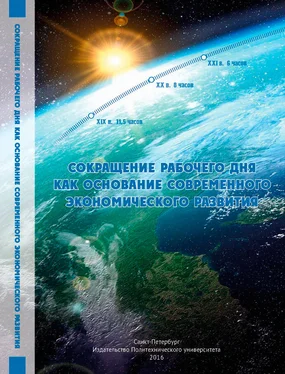32. Aguiar M.,Hurst E. Measuring trends in leisure: the allocation of time over five decades // The Quarterly Journal of Economics,№ 122(3), 2007, pp. 969-1006.
33. Alesina, A., Glaeser, E. аnd Sacerdote, B. Work and Leisure in the U.S. and Europe: Why so Different?// Discussion Paper Number 2068// April 2005, Harvard University, Cambridge, Massachusetts. – 73 p.
34. Altavilla C., Garofalo A., Vinci C. P. Evaluating the effects of working hours on employment and wages // Journal of Policy Modeling №27 (2005), pp. 647–664.
35. Atack J., Bateman F., Margo R. A. Productivity in manufacturing and the length of the working day: evidence from the 1880 census of manufactures // Explorations in Economic History №40 (2003), pp. 170–194.
36. Baek E. G., Oh W. The short-run production effect of the reduction of working hours // Journal of Policy Modeling №26 (2004), pp. 123– 144.
37. Barone G., Mocetti S. With a little help from abroad: The effect of low-skilled immigration on the female labour supply // Labour Economics №18 (2011) – pp. 664–675.
38. Bell D. N.F., Rutherford A. C. Older workers and working time // The Journal of the Economics of Ageing № 1-2 (2013), pp. 28–34.
39. Bishop K. W. The Idle Proletariat: Dawn of the Dead, Consumer Ideology, and the Loss of Productive Labour // The Journal of Popular Culture, Vol. 43, No. 2, 2010, pp. 234 – 248.
40. Bloom D. E. Aging and productivity: Introduction // Labour Economics № 22 (2013), pp. 1–4.
41. Bosch, G. and Lehndorff, S. Working-time reduction and employment: experiences in Europe and economic policy recommendations//Cambridge Journal of Economics, 2001, 25. P. 220.
42. Boulin J.-Y. French policies on working time A loss of meaning // Futures. June. 1993, pp. 587 – 601.
43. Bowman, John R. Capitalisms compared: welfare, work, and business. CQ Press. Los Angeles. 2013. – 376 p.
44. Brown M., Pitt-Catsouphes M., McNamara T. K., Besen E., Returning to the workforce after retiring: a job demands, job control, social support perspective on job satisfaction // The International Journal of Human Resource Management, 2014 Vol. 25, No. 22, pp. 3113–3133.
45. Cheng Y., Du C.-L., Hwang J-J., Chen I-S., Chen M-F., Su T-C., Working hours, sleep duration and the risk of acute coronary heart disease: A case–control study of middle-aged men in Taiwan // International Journal of Cardiology №171 (2014), pp. 419–422.
46. Chung H.,Tijdens K. Working time flexibility components and working time regimes in Europe: using company-level data across 21 countries // The International Journal of Human Resource Management, 2013 Vol. 24, No. 7, pp.1418–1434.
47. Chung, H.-J. Economics: the user’s guide. Published by the Penguin Group. 2014. – 154 p.
48. Coe N. B., Zamarro G. Retirement effects on health in Europe // Journal of Health Economics №30 (2011), pp. 77–86.
49. Coote A., FranklinJ., Simms A. 21 hours: why a shorter working week can help us to flourish in 21st century//The new economics foundation. 2010, February, pp. 38.
50. Coppola M., Wilke C. B. At What Age Do You Expect to Retire? Retirement Expectations and Increases in the Statutory Retirement Age // Fiscal studies, vol. 35, no. 2, (2014), pp. 165–188.
51. Costa D. L. The unequal work day: a long –term view. // NBER Working Paper No.6419, 1998, pp. 1-12
52. Costa D.L. The Wage and the Length of the Work Day: From the 1890s to 1991 // Journal of Labour Economics Vol. 18, No. 1, pp. 156– 181.
53. Dembe A. E. Factors shaping the development of working time regulation in the United States and Europe // International Labour Review, Vol. 150 (2011), No. 3–4, pp. 419 – 429.
54. Fischer F. M., Puttonen S., Skene D. J. 21st International Symposium on Shiftwork and Working Time: The 24/7 Society – From chronobiology to practical life // Chronobiology International, 2014; № 31(10): pp.1093–1099.
55. García-Pérez J.I., Jiménez-Martín S., Sánchez-Martín A. R. Retirement incentives, individual heterogeneity and labour transitions of employed and unemployed workers // Labour Economics №20 (2013), pp. 106–120.
56. Garnero A., Kampelmann S., Rycx F. Part-time work, wages, and productivity: evidence from Belgian matched panel data // Industrial & Labour Relations Review, № 67(B), July 2014, pp. 926-954.
57. Gimenez-Nadal J.I., Sevilla A. Total work time in Spain: evidence from time diary data // Applied Economics, 2014 Vol. 46, No. 16, pp.1894–1909.
58. Giugale, M. M. Economic development: what everyone needs to know. Oxford University Press. 2014. – 503 p.
59. Glazer S. Six of One, Half a Dozen of the Other: Problems With Working Fixed and Rotating Shifts // International Journal of Stress Management 2005, Vol. 12, No. 2, pp. 142–163.
60. Goerke L., Hillesheim I. Relative consumption, working time, and trade unions // Labour Economics №24 (2013), pp. 170–179
61. Gordo L.R , Skirbekk V. Skill demand and the comparative advantage of age: Jobs tasks and earnings from the 1980s to the 2000s in Germany // Labour Economics №22 (2013), pp. 61–69.
62. Hairault J-O., Langot F., Sopraseuth T., Distance to retirement and older workers’ employment: the case for delaying the retirement age // Journal of the European Economic Association September 2010 - 8(5): pp.1034–1076.
63. Harsh J., Yang R., Hull S. G. The impact of shift duration on the efficacy and tolerability of armodafinil in patients with excessive sleepiness associated with shift work disorder. // Current Medical Research & Opinion Vol. 30, No. 5, 2014, pp. 945–951.
64. Hart R. A. The Economics of Overtime Working. Cambridge University Press. – 10 p.
65. Herzog-Stein A., Zapf I. Navigating the great recession: the impact of working-time accounts in Germany// Industrial & Labour Relations Review, 67(3), 2014, pp. 891-925.
66. Huberman M., Minns C. The times they are not changin’: Days and hours of work in Old and New Worlds, 1870–2000 // Explorations in Economic History №44 (2007), pp. 538–567.
67. Hӓrmӓ M., Partinen M., Repo R., Sorsa M., Siivonen P. Effects of 6/6 and4/8watch systems on sleepiness among bridge officers // Chronobiology International. 2008, №25, pp. 413-423.
68. Izquierdo S. C. A value-oriented distinction between productive and unproductive labour // Capital & Class №90, 2006, pp. 37-63.
69. Kallis G., Kalush M, Flynn H.O., Rossiter J., Ashford N. “Friday off”: Reducing Working Hours in Europe // Sustainability 2013, №5, pp.1545-1567.
70. Kalwij A., Alessie R., Knoef M., Pathways to Retirement and Mortality Risk in The Netherlands // Eur J Population (2013) 29: 221–238.
71. Karhula K., Härmä M., Sallinen M, Hublin C., Virkkala J., Kivimäki M., Vahtera J.,Puttonen S. Association of job strain with working hours, shift-dependent perceived workload, sleepiness and recovery // Ergonomics, 2013 Vol. 56, No. 11, pp. 1640–1651.
72. Lakey G. Viking economics: How the Scandinavians Got it Right – and How We Can, Too. Melville House. 2016. – 287 p.
73. Lawless M., Whelan K.T. Understanding the dynamics of labour shares and inflation / Martina Lawless, Karl T. Whelan // Journal of Macroeconomics. – 2011. – No. 33.
74. Lehndorff S. It’s a long way from norms to normality: the 35-hour week in France // Industrial & Labour Relations Review, №67(3), July 2014, pp. 838-863.
75. Lehndorff S., Wagner A., Franz C. Development of working time in the EU Pub.: Thomas Handel /Dr. Axel Troost. 2010. – 145 p.
76. Mahlberg B., Freund I., Cuaresma J.C., Prskawetz A. Ageing, productivity and wages in Austria // Labour Economics № 22 (2013), pp. 5–15.
77. Mao H, Ostaszewski K. M., Wang Y. Optimal retirement age, leisure and consumption // Economic Modelling № 43 (2014), pp. 458–464.
Читать дальше












